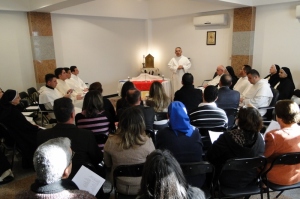So they left … rejoicing that they had been found worthy to suffer dishonor for the sake of the name. –Acts 5:41

I have recently gotten to know a remarkable Iraqi priest and scholar who is working to preserve the deeply rooted heritage of his country’s embattled Christian population. Though now a member of the Dominican Order, Fr. Najeeb originates from Iraq’s very ancient Chaldean Catholic Church, which is now a severely persecuted minority, despite a presence that far predates the very existence of Islam. The existence of this ancient minority is all too easily forgotten, but its perseverance offers valuable lessons for the broader Church.
For one thing, their experience of being viewed as foreigners in their own homeland reminds us of the sense in which this ought to be, to some extent, true of all Christians. If we are truly living the gospel, perhaps we should be looked at somewhat askance. What if, rather than seeking to preserve vestiges of privilege for the Church, we were to take any sign of the marginalization of its teachings and practices as cause for rejoicing, a sign that we’re doing something right? Furthermore, when we are tempted to mistake any loss of social privilege for persecution, the true suffering of our brothers and sisters elsewhere should give us pause.
Having said this, I hasten to add that I do not in any way wish to idealize persecution – especially since, in the case of Iraq’s Christian minority, certain external factors unjustly contribute to the perception of foreignness. Specifically, since the U.S. invasion of Iraq in 2003, the persecution of Iraqi Christians has intensified due to their being associated with the foreign occupation (a misperception already fed by President Bush’s earlier use of the word “crusade” in reference to U.S. military policy). This should raise disturbing implications for Christians in particular, yet the ramifications of the Iraq war for the country’s indigenous Christians have not been well addressed. I’d venture that most Americans – Christian or not, hawkish or dovish – have simply never been given cause to consider that this war, especially when defended via “holy war” rhetoric, has contributed to a situation that exacerbates the persecution of Christians.
Lest we fall prey to the false gospel of divinely sanctioned nationalism, the very existence of an indigenous Christian minority in Iraq reminds us that the Church is bigger than us. Morally, of course, there is no difference between the intrinsic value of the life of a Christian and that of the life of a Muslim (or anyone else for that matter). The point here is that when our concern for the safety of our Christian brothers and sisters in other parts of the world is trumped by our concern for national interests, we have lost sight of the catholicity of the Church.
With the 10th anniversary of the invasion of Iraq having come and gone last month with muted acknowledgement, I am reminded of another recent anniversary: that of Pope John XXIII’s great social encylical Pacem in Terris, promulgated 50 years ago but remaining all too timely. Emphasizing universal human dignity and global interdependence, the Holy Father reminded us that “the social progress, order, security, and peace of each country are necessarily connected with the social progress, order, security, and peace of all other countries” (Pacem in Terris 130).

Some of this may seem like old news, but knowing someone who is personally affected by the situation has reminded me of its ongoing human dimension behind the fading headlines. Fr. Najeeb, who has experienced multiple threats on his life, is less concerned for his own safety than for his community’s ability to keep its tradition alive. He also sees the violence that afflicts his country from both within and without as a problem bigger than the Church – fundamentally, a human problem. And he and other Church leaders and laypeople are witnessing to a better way, advocating education and basic human services rather than violence. “Indirectly, we’re preaching to them,” he says, by returning good for evil, living peaceably with their neighbors even when threatened.
I invite others to join me in praying for the Church in Iraq and its leaders. May we learn from their example of faith and courage under trying circumstances.












